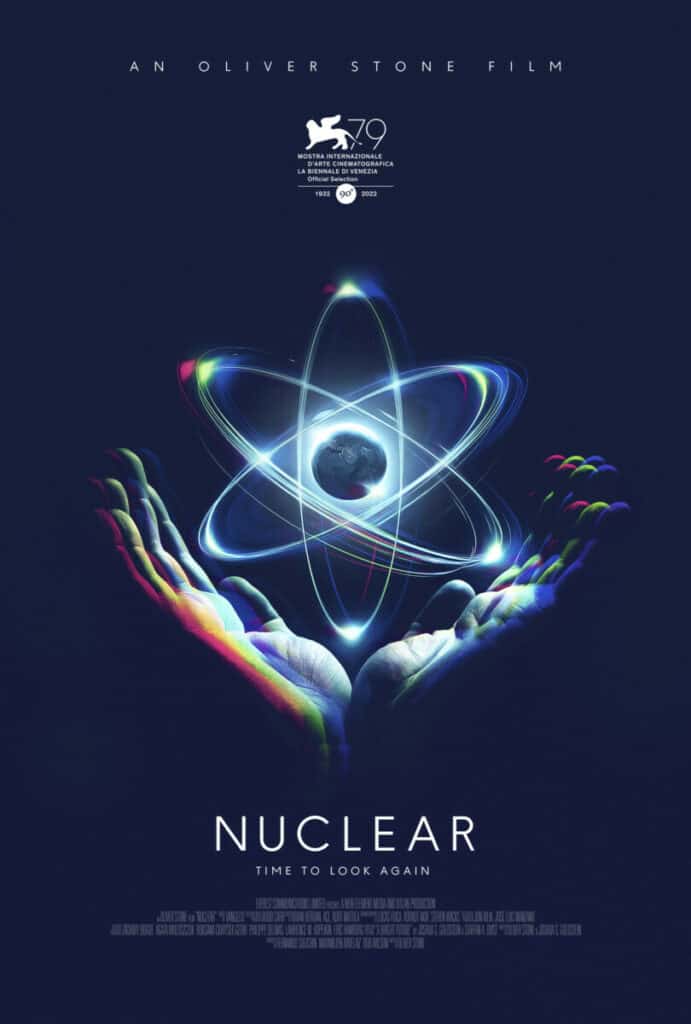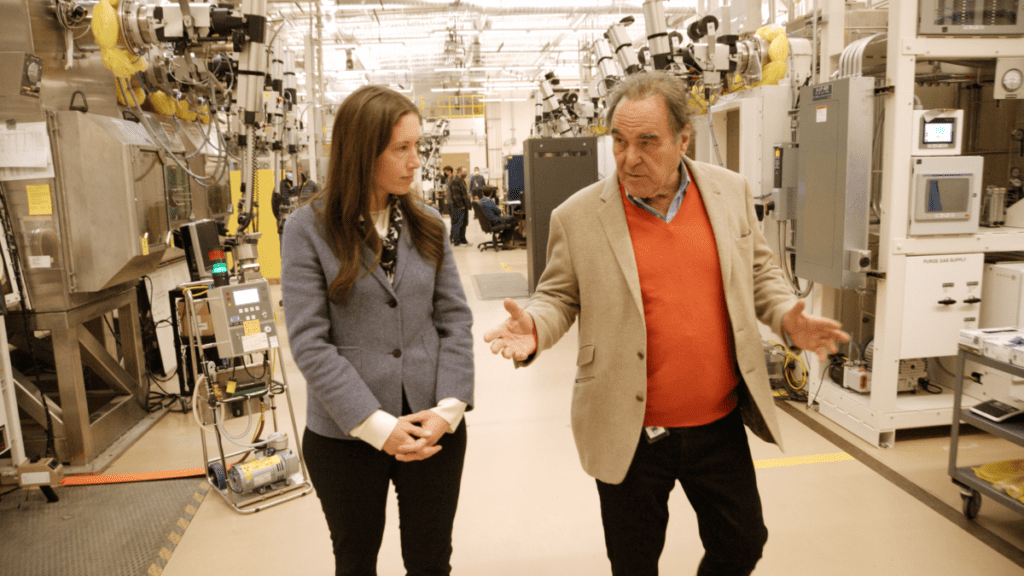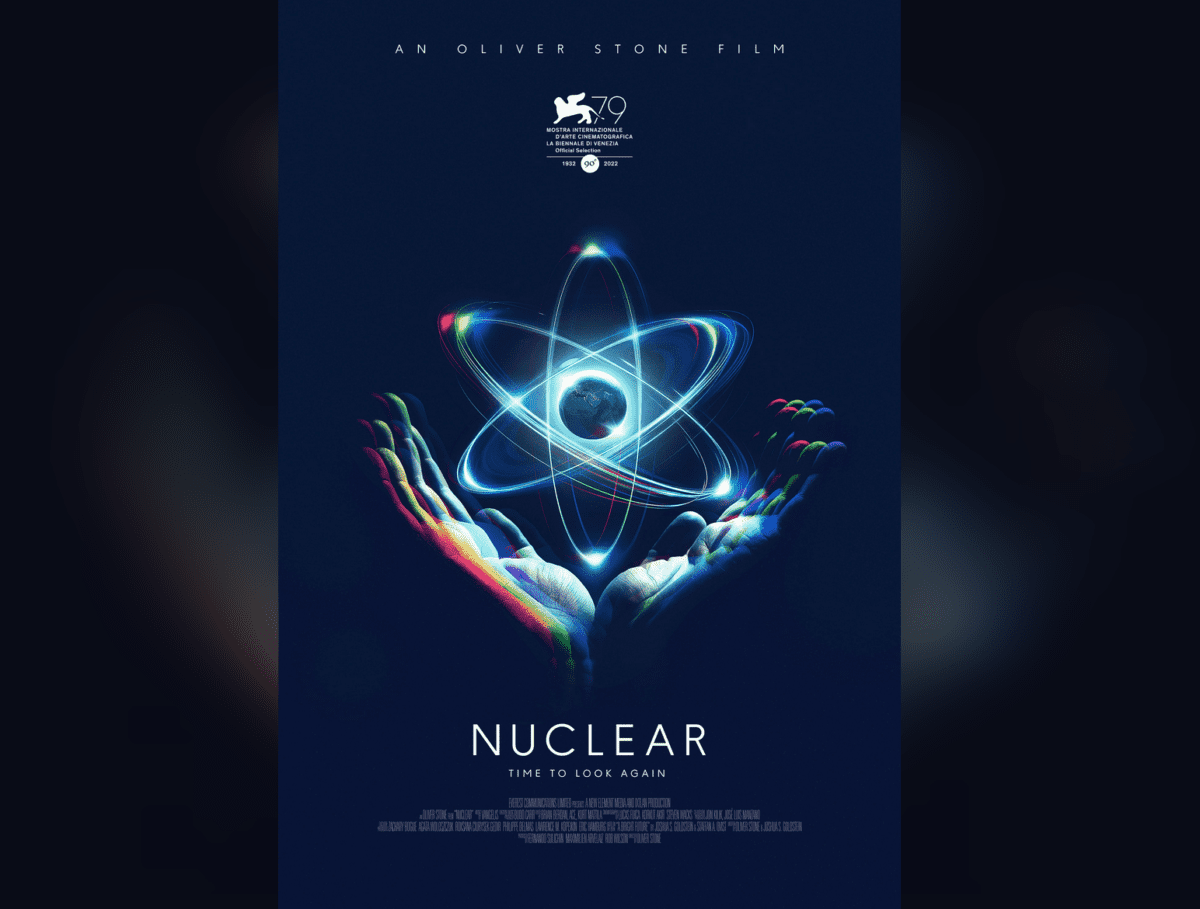Oliver Stone’s “Nuclear” – An optimistic look at a powerful tool for addressing climate change and energy security

an Oliver Stone film
By early 2019, Oliver Stone, a successful filmmaker who has created a long list of popular works of art, had become increasingly concerned and even depressed about what he had learned about the risk climate change posed to humanity. He’d watched Al Gore’s “Inconvenient Truth” and paid attention to dire warnings coming from credible scientific groups like the International Panel on Climate Change.
He noted that the solutions at the top of almost everyone’s list were ineffective in reducing fossil fuel consumption and the CO2 emissions produced when they are burned. He did not dislike renewables, but he realized they could not do all of the tasks that fossil fuels do for society.
Then he discovered and read “A Bright Future: How Some Countries Have Solved Climate Change and the Rest Can Follow” by Joshua Goldstein and Staffan Qvist. That excellent, accessible book taught him that nuclear energy had proven to be capable of replacing fossil fuels on a large, country-sized scale. That knowledge inspired him to do something to change our current trajectory related to using nuclear energy.
He also learned that many of the fears associated with nuclear energy were either related to confusion between nuclear weapons and nuclear power or to skillful public relations efforts by competitive energy sources to discourage the nuclear energy growth that would inevitably threaten their market share.
As a talented filmmaker and storyteller, he realized that he could and should use his talents to help overcome fears associated with nuclear energy and to convince decision makers that it is time to take a fresh look at nuclear energy.
Stone and Goldstein decided to collaborate on a script for a fact-filled documentary after realizing that was the most appropriate format a film designed to overcome fears with information. Using archival footage, contemporary interviews with nuclear experts and visits to nuclear research and development facilities in the US, France and Russia they tell a complex story spanning more than half a century in a relatively brief period of time.
But, as Blaise Pascal famously implied with his pithy quote “I would have written a shorter letter, but I did not have the time” it takes time to create a concise story. Stone and Goldstein invested two years in their creation, an effort that Stone said nearly “took the life” out of him.
The award-winning film’s full title is “Nuclear.”
Here is the IMDB’s current plot summary:
As fossil fuels continue to cook the planet, the world is finally becoming forced to confront the influence of large oil companies and tactics that have enriched a small group of corporations and individuals for generations. Beneath our feet, Uranium atoms in the Earth’s crust hold incredibly concentrated energy. Science unlocked this energy in the mid-20th century, first for bombs and then to power submarines, and the United States led the effort to generate electricity from this new source. Yet in the mid-20th century as societies began the transition to nuclear power and away from fossil fuels, a long-term PR campaign to scare the public began, funded in large part by oil interests. This campaign would sow fear about harmless low-level radiation and create confusion between nuclear weapons and nuclear power. With unprecedented access to the nuclear industry in France, Russia, and the United States, director Oliver Stone explores the possibility for the global community to overcome challenges like climate change and reach a brighter future through the power of nuclear energy.
I have a built-in bias about the film. Joshua Goldstein is a friend and a respected colleague in the “club” of pronuclear writers and researchers. He convinced Oliver Stone that I would be a good interviewee, especially given my experiences as an operating engineer on nuclear submarines and my long term interest in the efforts by fossil fuel interests to teach the public to fear and distrust nuclear energy.
In July of 2021, Stone and his production team invited me to visit them in Los Angeles for a sit down interview at Stone’s comfortably impressive home. The night before we talked, Stone invited Joshua and me to share a home-cooked meal and to get to know each other. I’ll always remember having an after-dinner glass of wine while relaxing in his poolside sitting area and discussing the differences between California and Florida pools. (Caged pools are unheard of in virtually bug-free CA, they are de rigueur in buggy FL.) He was shocked to hear about the alligator that lives in the pond behind my home and couldn’t believe I liked living with a “dinosaur” in my back yard.
Of course, we also talked about nuclear energy and its importance in clean energy production.

“Nuclear” also includes extensive interviews with Ashley Finan, Director of DOE’s Nuclear Reactor Innovation Center; Shannon Bragg-Sitton, Director for the Integrated Energy & Storage Systems Division at INL; Isabelle Boemke, the famous Tik-Toc and Twitter nuclear influencer; Jake Dewitt and Caroline Cochran, co-founders of Oklo, and Joshua Goldstein, author of “A Bright Future” and the script for “Nuclear.”
“Nuclear” isn’t playing in theaters. It might go directly to streaming services, even though it looks good on a big screen. It’s the kind of film that is designed to inform and convince. It should make a useful contribution to helping the public better understand nuclear energy and the immense capacity it has for helping address some of humanity’s most wicked challenges.
Film reviews:
- Variety: Oliver Stone on Nuclear Energy: ‘We Need to Get Away From Mentality of Fear’
- The Playlist: Oliver Stone Talks ‘Nuclear’ And Hollywood’s Misguided Love Of Disaster Movies [Interview]
- Firstshowing.net: Venice 2022: Oliver Stone’s Persuasive & Educational ‘Nuclear’ Doc
- The Wrap: ‘Nuclear’ Film Review: Oliver Stone Defends Nukes as a Power Source in Didactic Documentary
- Hollywood Reporter: ‘Nuclear’ Review: Oliver Stone’s Lazy Case for Nuclear Power
- Deadline: Oliver Stone Talks Climate Change Being ‘The Killer Of All Time,’ An American Civil War Over Trump & Making The Case For Nuclear Power In New Film — Venice Q&A + Clip
- DW: Oliver Stone: Courting controversy with ‘Nuclear’
Interviews with Stone and Goldstein at Venice Film Festival



Wow! It looks like a big name documentary maker is telling Rod’s story. I doubt if there would be anything in the movie that hasn’t been seen in Atomic Insights over the years.
This movie is timely with the shutoff of the natural gas by the Russians. I’ve read that energy costs in Europe will be high this Winter. Necessity is the Mother of Invention. People are being forced to see this realistic energy source.
He uses the phrase, “Fear is the Mind Killer.” I guess he has read Dune.
even before Putin’s Excellent Adventure, the irony of Germany buying filthy Polish coal-fired power after mothballing its fleet in knee-jerk to Fukushima was hard to witness.
bravo Mr. Stone
This is fantastic coming from one of the biggest-name directors out there.
I watched NUCLEAR the California premiere in Menlo Park on September 19, 2022. Definitely a must-see movie. Here are some updates as of January 23, 2023:
1. https://www.cnbc.com/2023/01/18/oliver-stone-slams-environmental-movement-over-actions-on-nuclear.html
2. https://www.nytimes.com/2023/01/18/business/dealbook/oliver-stone-nuclear-davos-wef.html (I liked the reporter noting that the Davos crowd was interested enough that there were people sitting on the floor in order to watch the movie.)
3: https://www.barrons.com/articles/energy-nuclear-power-climate-51674249399
Gene:
FYI, the film producers have updated the name. Its current title is “Nuclear Now!” I believe that new title is much better as it projects a sense of urgency and an action that should be taken.
I look forward to seeing and promoting Nuclear (and you in it).